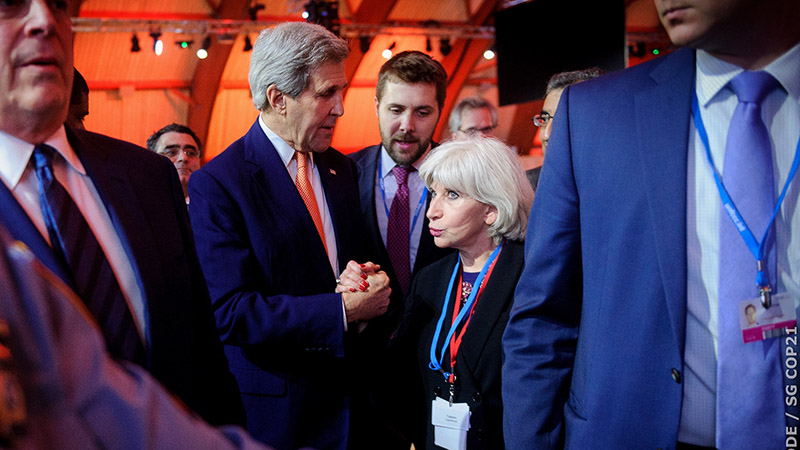Donald Trump’s first budget proposal as US president has confirmed the climate community’s worst fears.
Swingeing cuts to climate programmes and research at home and abroad will undermine international efforts to protect people from dangerous global warming, veterans of UN talks told Climate Home.
Laurence Tubiana, one of the architects of the historic Paris climate deal, described the US U-turn as “shocking”.
“It is not the final budget of course and I hope that Congress will revise that,” said Tubiana, who now heads the European Climate Foundation. “But it is an intention, it is a signal clearly and it is a pity because the US will not be truthful to its commitments. That will certainly create a lot of diplomatic feedback.”
Chai Qimin, an international climate cooperation expert at China’s National Development and Reform Commission, said US breach of trust was already undermining economic transition inside the world’s biggest carbon polluter.
“It is undeniable that more questions are being raised in Chinese government and industry,” said Chai. “An ambitious green plan will be more difficult to implement than previously – and may even meet scepticism and opposition, if the US lowers its ambitions in such a way.”
The US stance also eases pressure on India to steer away from coal, former environment minister Jairam Ramesh suggested: “India will continue with its aggressive solar energy programme but it may have earned a breather to execute its coal expansion plans.”
Weekly briefing: Sign up for your essential climate news update
Under Barack Obama, the US formally joined the Paris Agreement, pledging greenhouse gas emission cuts and financial support to poorer countries.
Trump is now seeking to de-fund the UN climate body (UNFCCC) that oversees the deal, which points towards an intention to withdraw from the process. Contributions to the UN’s climate science panel (IPCC) and the Green Climate Fund are also on the chopping block.
Trump’s budget director Mick Mulvaney (below) told reporters at a press conference on Thursday that the president considered spending money on climate change programmes to be a “waste of [taxpayers’] money”.
The degree of political consensus achieved in Paris was “an historic accomplishment”, said Thoriq Ibrahim, environment and energy minister for the Maldives and head of the small-islands coalition at climate negotiations. “But turning the agreement into action still requires institutions like the IPCC, UNFCCC, and Green Climate Fund. Budget gaps in these areas, if not filled by other means, would damage the work communities are doing on the ground to cut emissions and adapt to climate impacts that can no longer be avoided.”
Chai expressed particular concern about cuts to science and satellite programmes. “There are many climate deniers like Trump in America, so fundamental research on climate science is of pivotal importance for all to dig out the truth,” he said. “Hampering funding for the NASA Earth-monitoring program will be a huge sacrifice and damage on climate studies. ”
Comment: How the G20 could save Paris climate deal from Trump
Since Trump’s election, other signatories to the Paris Agreement including China, India and the EU have reaffirmed their commitments. None have declared an intention to follow the US out of the door.
German chancellor Angela Merkel is expected to raise the subject with Trump in a meeting at the White House on Friday. Climate change is high on the agenda of the next G20 leaders’ summit in Hamburg this July.
Whether others are able or willing to fill the void left by the US is less clear. The Paris Agreement’s overarching goal to hold global warming “well below 2C” hinges on ratcheting up ambition over time. Existing pledges do not go far enough.
An early meeting with Al Gore aside, Trump’s team has given little time to climate advocates. Secretary of state Rex Tillerson reportedly snubbed UN climate chief Patricia Espinosa.
Tubiana called on US businesses to highlight the economic opportunities in clean energy and defences against climate change impacts. “I think the best way to make the case is of course the domestic rationale for it,” she said. “That is now the job of businesses who think it will create more jobs, more investment to take that up with the administration.”
This week 1,000 businesses and investors took out ads in major US papers encouraging Trump to retain ambitious climate policies.
